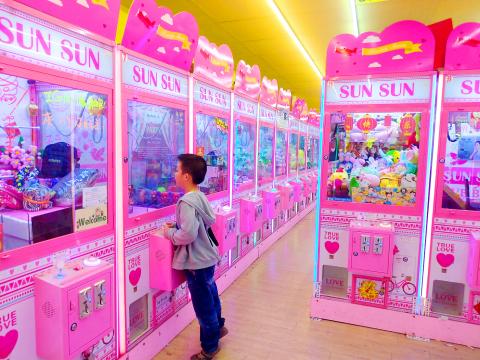People should be aware of the symptoms of addiction if they find themselves spending a lot of money on claw machines, Tainan Municipal An-Nan Hospital psychiatrist Chang Chun-hung (張俊鴻) warned.
Most people can enjoy claw machines as an occasional activity, but those with tendencies toward addiction might find that they are unable to pull themselves away, even if they win prizes, Chang said.
Chang, who is also director of the hospital’s psychiatry department, cited the case of a 35-year-old man surnamed Lin (林), who he treated for severe addiction to claw machines.

Photo: Tsai Ya-hua, Taipei Times
Lin, who worked as an elevator repairman, spent all his money on the machines and even took out a loan to continue using them, Chang said.
Lin turned to theft to fuel his habit — for which he was arrested and charged, costing him his job, Chang said.
In a separate case, a 40-year-old construction worker surnamed Chang (張) spent all of his salary of about NT$20,000 on claw machines, Chang Chun-hung said.
However, after his money was gone and he still did not have the Bluetooth speaker he was after, the construction worker used a strong magnet to maneuver the gadget out of the machine, Chang Chun-hung said, adding that the owner of the arcade reported the incident to the police.
An explanation for the popularity of claw machines could be the psychological effects of the “cute” figurines they often contain, the psychiatrist said.
People are also drawn to bright and colorful objects, he said, citing research involving newborns.
The upbeat music that claw machine parlors usually play also motivates people to spend, he said.
Research has uncovered new triggers for pleasure centers in the brain, and there is speculation that claw machines trigger these, releasing dopamine, he said.
As with other addictions, those who become hooked on claw machines might find that they are drawn to more expensive or challenging machines, he said.
Furthermore, people might experience withdrawal symptoms or a sense of helplessness over their perceived irrationality, Chang Chun-hung said.
It is common for people with an addiction to have other conditions, he said. More than half of young people with addictions also show signs of depression or attention deficit hyperactivity disorder.
Both conditions must be addressed at the same time for treatment to be effective, he said, adding that it did not necessarily require medication.
Those who find themselves unable to stop using claw machines — or stop other behaviors — should consult a psychiatrist, such as those at his hospital, he said.

Weather conditions across Taiwan are expected to remain stable today, but cloudy to rainy skies are expected from tomorrow onward due to increasing moisture in the atmosphere, according to the Central Weather Administration (CWA). Daytime highs today are expected to hit 25-27°C in western Taiwan and 22-24°C in the eastern counties of Yilan, Hualien, and Taitung, data on the CWA website indicated. After sunset, temperatures could drop to 16-17°C in most parts of Taiwan. For tomorrow, precipitation is likely in northern Taiwan as a cloud system moves in from China. Daytime temperatures are expected to hover around 25°C, the CWA said. Starting Monday, areas

A Taiwanese software developer has created a generative artificial intelligence (AI) model to help people use AI without exposing sensitive data, project head Huang Chung-hsiao (黃崇校) said yesterday. Huang, a 55-year-old coder leading a US-based team, said that concerns over data privacy and security in popular generative AIs such as ChatGPT and DeepSeek motivated him to develop a personal AI assistant named “Mei.” One of the biggest security flaws with cloud-based algorithms is that users are required to hand over personal information to access the service, giving developers the opportunity to mine user data, he said. For this reason, many government agencies and

The National Fire Agency on Thursday said a series of drills simulating a magnitude 8.5 earthquake would be held in September to enhance the government’s emergency response capabilities. Since earthquakes cannot be predicted, only by continuously promoting disaster prevention measures could Taiwan enhance its resilience to earthquakes, agency Director-General Hsiao Huan-chang (蕭煥章) said in a news release. The exercises would be held to mark annual National Disaster Prevention Day on Sept. 21, the aim of which is to test Taiwan’s preparedness and improve its earthquake resilience in case of a major temblor, Hsiao said. As part of those drills, an earthquake alert would

STRICTER ENFORCEMENT: Taipei authorities warned against drunk cycling after a sharp rise in riding under the influence, urging greater public awareness of its illegality Taipei authorities have issued a public warning urging people not to ride bicycles after consuming alcohol, following a sharp rise in riding under the influence (DUI) cases involving bicycles. Five hundred and seven people were charged with DUI last year while riding YouBikes, personal bicycles, or other self-propelled two-wheelers — a fourfold increase from the previous year, data released by the Taipei Police Department’s Traffic Division showed. Of these, 33 cases were considered severe enough to be prosecuted under “offenses against public safety,” the data showed. Under the Road Traffic Management and Penalty Act (道路交通管理處罰條例), bicycles — including YouBikes and other